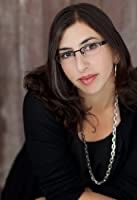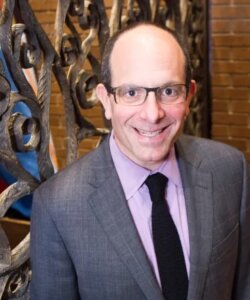After Roe: How Jewish groups in states with abortion bans are responding
Some rabbis are setting up funds to help pregnant people travel for services. Others are focusing on politics.

Graphic by Angelie Zaslavsky
Reeling from last week’s Supreme Court ruling overturning Roe v. Wade, a synagogue in Missouri, one of nine states where abortion is now totally banned, set up a fund to help people needing to travel to terminate pregnancies. Within hours of it being established on Sunday, a woman asked for help, and members of the congregation volunteered to drive her to a clinic in neighboring Illinois.
“She’s a local person who knows our congregation to be generous and supportive,” said Rabbi Carnie Shalom Rose of Congregation B’nai Amoona, a Conservative synagogue in St. Louis. “We are a blue city in a red state,” he added. “The fund we set up is now coming from my discretionary fund and we’ll find a donor to endow it.”
Five hundred miles away in Oklahoma City, Rabbi Abby Jacobson of Emanuel Synagogue said her community was sad and scared about the impact of the ruling but unable to take any direct action because of a state law passed in May that allows private citizens to sue anyone who helps people obtain abortions.
“We could be prosecuted for even saying in a newspaper that we would assist someone to get an abortion,” Rabbi Jacobson said. “In Oklahoma, the Jews represent 0.0013% of the population. We are joining with strong interfaith communities to do what we can to help people through this time and continuing trying to fight decisions made for the purpose of religion.”
Some 83% of American Jews think abortion should be legal in all or most cases, according to the Pew Research Center, compared to 61% of the U.S. population overall. The largest Jewish communities are in New York and California, states that are moving to shore up abortion rights and provide services to people beyond their borders. But there are also significant Jewish populations in many of the 26 states where abortion is expected to soon be outlawed or severely restricted.

The National Council of Jewish Women, which helped establish what eventually became Planned Parenthood clinics in the U.S., has partnered with the National Abortion Federation, raising $200,000 since May 15 for its new Jewish Fund for Abortion Access. Other national organizations, including the Jewish Orthodox Feminist Alliance and the Reform, Reconstructionist and Conservative movements, have issued strong statements opposing the court’s ruling and are encouraging people to support NCJW.
Jody Rabhan, chief policy officer of NCJW, said the money raised would go directly to paying for travel costs, including hotels since many states have waiting periods of up to 72 hours between an abortion consultation and procedure, as well as for child care and lost wages.
She said the group is also “working on a strategy of legislative responses” at the state level. “There are things we can do, this is not over,” Rabhan said. “This is not just a woman’s issue, it impacts everybody.”
NCJW and the Israel on Campus Coalition have decided to cover travel expenses for employees or their dependents to obtain abortion services, eJewishPhilanthropy reported earlier this week, and Hillel International is considering doing so. Jewish Federations in the states with abortion bans have so far taken a cautious approach, eJP reported, though there is discussion in Alabama of filing a lawsuit challenging the ban on religious-freedom grounds, since Jewish law allows abortions in some cases, a strategy already underway in Florida.
“The Supreme Court has thrown it to every state to decide, so we will see battles in every state,” said Rabbi Elyse Wechterman, executive director of the Reconstructionist Rabbinical Association. She noted that in her state, Pennsylvania, there is state legislation pending that would severely restrict abortions and a gubernatorial election in November in which a Jewish Democrat who supports abortion rights faces a Christian nationalist who is staunchly anti-abortion.

Rabbi Danya Ruttenberg, who sits on the Rabbinical Assembly’s gender and power committee and is scholar-in-residence at NCJW, spoke of a “multi-pronged approach” that includes working to get out the vote, lobbying in state legislatures, and helping people who need to travel to get the services they need.
“We are going to fight to get our right to abortion access back,” Ruttenberg said. “We have to be fighting on every prong. We need all hands on deck – and there is a lot of deck.”
Meanwhile, individual rabbis are crafting individual responses. Rabbi Barry Black of Congregation B’nai Israel in Little Rock, Arkansas, said he is planning to offer his discretionary fund to help people travel to the closest abortion clinic, which is 344 miles away in Wichita, Kansas.

“It is going to be costly for low-income women, women of color, and people with a uterus who don’t identify as women will be especially vulnerable and may have a hard time accessing a safe and legal abortion,” Black said. “I have had many people thank me for publicly declaring that I would make myself available to assist people who need to travel to obtain a safe and legal abortion.”
Kansas currently allows abortion up to 22 weeks, and the state’s Supreme Court ruled in 2019 that the state constitution guarantees the right to abortion. But there is an initiative on the Aug. 2 ballot that would amend the constitution, and thus add restrictions or outright ban abortions.
“Everybody here is focused on that,” said Rabbi Doug Alpert of Congregation Kol Ami, a 60-family synagogue across the state line in Kansas City, Missouri.
In Dallas, Rabbi Nancy Kasten of a group called Faith Commons, said she attended an interfaith vigil at a local church after Shabbat services the night of the Supreme Court ruling and that people there talked about creating a fund, like the one at the St. Louis synagogue, to support people needing to travel to obtain legal abortions.
Rabbi Anna Boswell-Levy of Congregation Kol Emet in Yardley, Pennsylvania, said she would “absolutely” use her discretionary fund “to help someone who needed an abortion or other necessary medical care.”
Another rabbi in Pennsylvania, who spoke on condition of anonymity to maintain her privacy, said she discovered from personal experience that even when abortion is legal, it is not always easy to obtain. When she discovered she was pregnant again shortly after giving birth about five years ago, she was overwhelmed by the thought of having another child so soon.
She said she drove to a Planned Parenthood clinic an hour from her home to get information about her options. But Pennsylvania law barred them from offering medical advice. Instead, the rabbi said, she was told she would be required to first watch a video and then return 48 hours later if she wanted have an abortion. So she drove to a clinic in New Jersey.
“Ultrasound revealed I had had an early miscarriage, because there was no heartbeat,” the rabbi recalled, “and the embryo did not spontaneously abort.” The doctors removed the dead fetus.





















